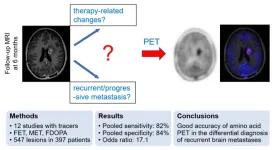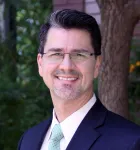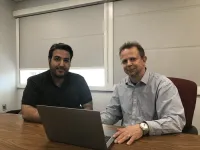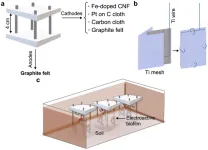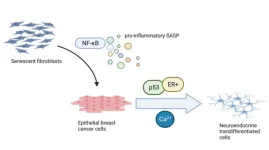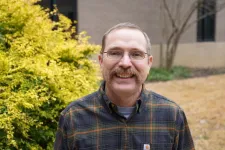(Press-News.org) Long COVID risk has been found to increase with low levels of vitamin D, according to research presented at the 25th European Congress of Endocrinology in Istanbul. The findings suggest that individuals should have their vitamin D levels checked after COVID-19.
Also known as post COVID-19 syndrome, long COVID is a new condition in which the effects of COVID-19 last for more than 12 weeks after contracting the initial infection. Studies have shown that it affects 50-70% of patients previously hospitalised for COVID-19, yet very little is known about the condition. One risk factor for worse outcomes for hospitalised COVID-19 patients, such as intubation and mechanical ventilation or death, is low vitamin D levels, but its role in long COVID has not been adequately investigated.
For this study, supported by Abiogen Pharma SpA, researchers from the Vita-Salute San Raffaele University and IRCCS San Raffaele Hospital in Milan examined 100 patients aged 51-70 years, with and without long COVID. They measured their vitamin D levels when first admitted to hospital for COVID-19 and six months after being discharged, and found lower vitamin D levels in patients with long COVID compared to those without. This result was more evident in patients who experienced ‘brain fog’ symptoms, such as confusion, forgetfulness and poor concentration, at the six-month follow-up.
The researchers included patients without any bone conditions and only those who went to hospital for COVID-19, without ending up in the intensive care units (ICUs). They matched the two groups, with and without long COVID, in terms of age, sex, pre-existing chronic diseases and COVID-19 severity. “Previous studies on the role of vitamin D in long COVID were not conclusive mainly due to many confounding factors,” said lead investigator Professor Andrea Giustina. “The highly-controlled nature of our study helps us better understand the role of vitamin D deficiency in long COVID, and establish that there is likely a link between vitamin D deficiency and long COVID.”
While Professor Giustina acknowledges that larger studies are needed to confirm this link, he and his team are now focussed on finding out whether vitamin D supplements can reduce the risk of long COVID. “Our study shows that COVID-19 patients with low vitamin D levels are more likely to develop long COVID but it is not yet known whether vitamin D supplements could improve the symptoms or reduce this risk altogether.”
The results of this study were also recently published in The Journal of Clinical Endocrinology & Metabolism.
--------ENDS-------
Notes for Editors:
For press enquiries, or to arrange an interview with the study authors, please contact the ECE 2023 press office:
Joanna Williams
Communications Executive
Mob: +44 (0) 7876 824 027
Email: joanna.williams@endocrinology.org
The study “Low 25(OH) vitamin D levels are associated with Long COVID syndrome in COVID-19 survivors” is a poster presentation that will take place on Saturday 13 May 2023 at the European Congress of Endocrinology at the Halic Congress Center in Istanbul, Turkey. See the full scientific programme here.
The study “Low vitamin D levels are associated with Long COVID syndrome in COVID-19 survivors” has been recently published in The Journal of Clinical Endocrinology & Metabolism.
The European Society of Endocrinology (ESE) provides a platform to develop and share leading research and best knowledge in endocrine science and medicine. By uniting and representing every part of the endocrine community, we are best placed to improve the lives of patients. With over 5,000 individual members and through the 51 National Societies involved with the ESE Council of Affiliated Societies (ECAS), ESE represents a community of over 20,000 European endocrinologists. We inform policy makers on health decisions at the highest level through advocacy efforts across Europe.
END
Low levels of vitamin D linked to long COVID
2023-05-13
ELSE PRESS RELEASES FROM THIS DATE:
Accelerated delivery of transcranial magnetic stimulation is safe and effective
2023-05-12
May 12, 2023 — Accelerated schedules for repetitive transcranial magnetic stimulation (rTMS) can be offered to patients experiencing treatment-resistant major depressive disorder (MDD), a group of clinician–researchers and neuroscientists have concluded. The group cautions that such treatment should be proposed only after detailed discussion with patients about acceleration being an alternate form of rTMS scheduling, with documentation of informed consent.
The recommendations are published in a ...
Amino acid PET successfully differentiates recurrent brain metastases, reducing invasive procedures and overtreatment
2023-05-12
Reston, VA—A newly published meta-analysis indicates that amino acid PET can accurately differentiate recurrent or progressive brain metastases from treatment-related changes. A specificity of 84 percent suggests that it may reduce the number of invasive procedures and overtreatment in patients who in fact experience treatment-related changes. This research was published in the May issue of The Journal of Nuclear Medicine.
Brain metastases occur in 20 to 40 percent of all cancer patients and are most likely ...
Is it too late to change your mind? Study reveals ‘developmental window’ for thinking styles
2023-05-12
Key takeaways
Researchers studied the way different generations in Romania determined the truth of information following the country’s transition from authoritarianism to democracy.
Those who were born and raised after the transition were more likely than older cohorts to compare and evaluate different perspectives before deciding who is right.
The factors associated with the youngest generation’s style of thinking were greater exposure to formal education and social media.
While people change and learn throughout life, experts recognize ...
TVT 2023 late-breaking science announced
2023-05-12
NEW YORK – May 12, 2023 – The Cardiovascular Research Foundation (CRF) announced that TVT: The Structural Heart Summit will feature 15 Late-Breaking Clinical Science studies. An annual meeting featuring cutting-edge research and techniques for structural heart interventions, TVT will take place June 7-10, 2023, at the Phoenix Convention Center – West in Phoenix, Arizona.
TVT has become the epicenter of innovation and collaboration in the structural heart arena over its 16-year history. The meeting brings together world-renowned experts and master operators to help translate novel discoveries into practical therapies for patients with valvular heart disease.
TVT’s ...
UArizona Engineering alum returns to lead School of Mining and Mineral Resources
2023-05-12
Misael Cabrera has been selected through a nationwide search as the inaugural director of the School of Mining and Mineral Resources. The school was created in 2021 and is jointly housed in the College of Engineering and the College of Science, with strong partnerships to additional colleges and centers.
“Our role is to deliver talent and technology through research, but also to change the top-of-mind association with mining. We can create real solutions that both industry and our planet need,” said Cabrera.
Cabrera, who began the position in April, most ...
Researchers track antimicrobial resistance in E. coli isolated from swine
2023-05-12
The spread of drug-resistant microbes has become a global health concern that threatens our ability to treat infections. The widespread use of antimicrobials in livestock, such as swine farms, exacerbates this problem. Therefore, we need surveillance systems to monitor these microbes to support the public health authorities. To this end, researchers have tracked the antimicrobial resistance of Escherichia coli isolated from swine.
Antimicrobials are essential for preventing and treating infections in humans and animals. According to the US Food and Drug Administration, 70% of all antibiotic ...
Carbon-based cathodes impact biofilm composition and performance in soil microbial fuel cells
2023-05-12
In the context of increasing energy demands and environmental concerns, renewable energy solutions are crucial for achieving net-zero emissions by 2050. Microbial electrochemical technologies, such as SMFCs, are cost-effective and environmentally friendly, making them an attractive option for green energy systems. SMFCs utilize endogenous microorganisms present in soil to convert organic matter into electricity, offering a sustainable energy source and a self-powered in situ bioremediation strategy for contaminated soils.
Cathode materials play a significant role in the performance of microbial fuel cells. In this study, researchers compared the performance ...
Healthy teeth thanks to the "washing machine effect”
2023-05-12
Ruminants like cows have developed an unusual way of digesting their food: they ingest plants, give them a rough chewing and then swallow the half-chewed mash before regurgitating it repeatedly and continuing to chew. This has clear advantages, as a research team including the University of Göttingen has shown: the regurgitated mushy food contains much less hard grit, sand and dust than the food that they first ingested. This protects the teeth from being ground down during the chewing process. This ...
The senescence-associated secretory phenotype induces neuroendocrine transdifferentiation
2023-05-12
“We recently unveiled a new interesting role for SASP: its ability to induce neuroendocrine transdifferentiation (NED) in breast cancer epithelial cells [3].”
BUFFALO, NY- May 12, 2023 – A new editorial paper was published in Aging (listed by MEDLINE/PubMed as "Aging (Albany NY)" and "Aging-US" by Web of Science) Volume 15, Issue 8, entitled, “The senescence-associated secretory phenotype induces neuroendocrine transdifferentiation.”
In this editorial, researchers Anda Huna, Nadine Martin and David Bernard from the Université de Lyon discuss the senescence-associated secretory phenotype (SASP). SASP, ...
Steckel selected as a Southern Weed Science Society Fellow
2023-05-12
Larry Steckel, row crop weed specialist and professor in the Department of Plant Sciences at the University of Tennessee Institute of Agriculture, has been named a Fellow of the Southern Weed Science Society (SWSS).
The award was given to honor Steckel’s years of research and contributions to weed prevention in row crop agriculture. Steckel was among only a small group of esteemed researchers to receive the honor, presented to him during the annual meeting of the SWSS.
Steckel says he is proud to be named a Fellow, and that he knows the research and extension work conducted by weed specialists across the ...
